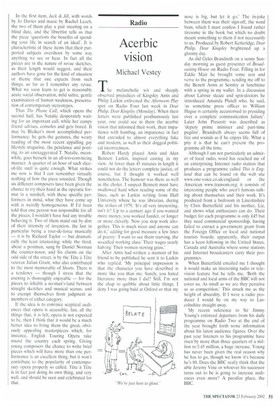Acerbic vision
Michael Vestey
The melancholic wit and sharply observed prejudices of Kingsley Amis and Philip Larkin enlivened the Afternoon Play spot on Radio Four last week in Dear Philip, Dear Kingsley (Monday). When their letters were published posthumously last year, one could see in them the acerbic vision that informed their work, their impatience with humbug, an impatience in fact that extended to almost everything fake and modern, as well as their dogged political incorrectness.
Robert Hardy played Amis and Alan Bennett Larkin, inspired casting in my view. At fewer than 45 minutes in length it could not do the letters complete justice, of course. but I thought it worked well nonetheless. The humour was there as well as the choler. I suspect Bennett must have swallowed hard when reading some of the lines, such as Larkin writing from Hull University where he was librarian, during the strikes of 1979, 'It's all very interesting, isn't it? Up to a century ago if you wanted more money, you worked harder, or longer or more cleverly. Now you stop work altogether. This is much nicer and anyone can do it,' adding for good measure a few lines of poetry: 'I want to see them starving, the so-called working class/ Their wages yearly halving/ Their women stewing grass.'
After Amis had written a memoir of his friend to be published he sent it to Larkin who replied. 'My principal impression is that the character you have described is more like you than me. Surely, you hated literature more than I did? Still, I'm not the chap to quibble about little things. I deny I was going bald at Oxford or that my nose is big, but let it go.' The in-joke between them was their sign-off, the word bum, which I must confess I found rather tiresome in the book but which no doubt meant something to them if not necessarily to us. Produced by Robert Ketteridge, Dear Philip, Dear Kingsley brightened up a gloomy day.
As did Gyles Brandreth on a sunny Sunday morning as guest presenter of Broadcasting House on Radio Four. Filling in for Eddie Mair he brought some zest and verve to the programme, sending me off to the Benett Arms at Semley at lunchtime with a spring in my wallet. In a discussion about Labour sleaze and spin-doctors he introduced Amanda Platell who, he said, 'as sometime press officer to William Hague is certainly accustomed to presiding over a complete communication failure'. Later John Prescott was described as 'deputy prime minister and part-time pugilist'. Brandreth always seems full of fizz and sounds as if he enjoys life. What a pity it is that he can't present the programme all the time.
Although I am not particularly an admirer of local radio, word has reached me of an enterprising Internet radio station that produces a programme called This is England that can be found on the web site www.one-voice.co.uldengland/ or the American www.transom.org; it consists of interesting people who aren't famous talking about themselves and their work. It's produced from a bedroom in Lincolnshire by Chris Butterfield and his mother. Liz, and shows what enthusiasm can do. Their budget for each programme is only /45 but they need commercial sponsorship, having failed to extract a government grant from the Foreign Office or local and national tourists boards; apparently, their output has a keen following in the United States. Canada and Australia where some stations and Internet broadcasters carry their programmes.
When Butterfield emailed me I thought it would make an interesting radio or television feature but he tells me, 'Both the national and local arms of the BBC will not cover us. As small as we are they perceive us as competition.' This struck me as the height of absurdity, If I were a radio producer I would be on my way to Lincolnshire straight away.
My recent reference to Sir Jimmy Young's enforced departure from his daily programme on Radio Two at the end of the year brought forth some information about his latest audience figures. Over the past year listeners to his programme have risen by more than three quarters of a million to 5.45 million, a huge increase. Young has never been given the real reason why he has to go, though we know it's because he's 80. Does the BBC really think that the able Jeremy Vine or whoever his successor turns out to be is going to increase audiences even more? A peculiar place, the BBC.






































































 Previous page
Previous page